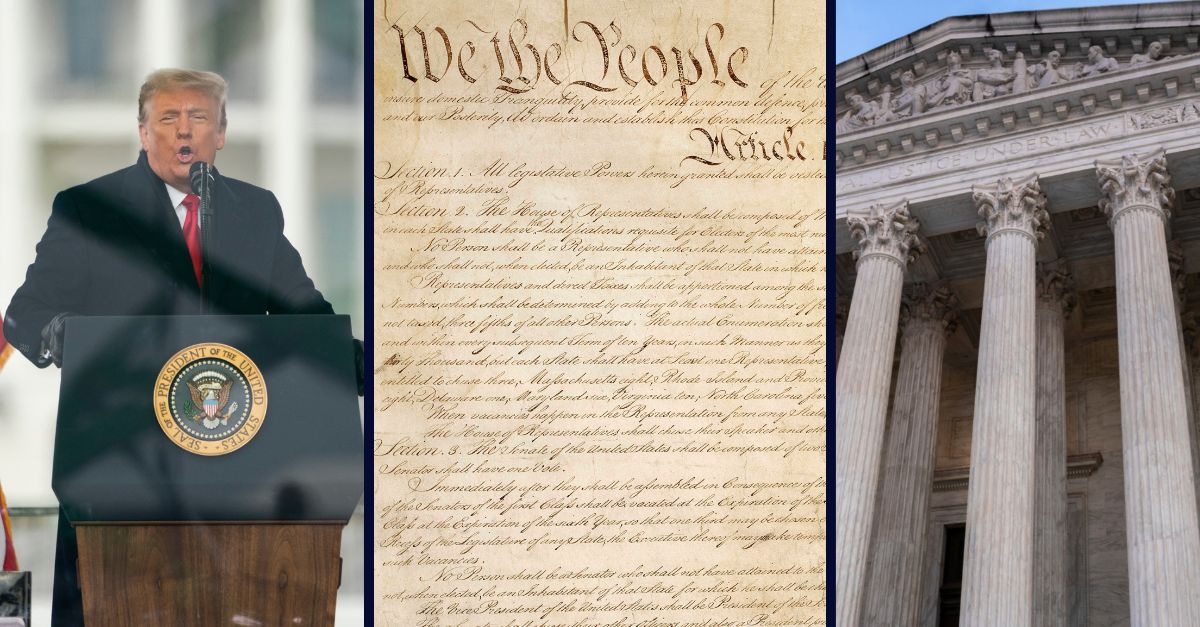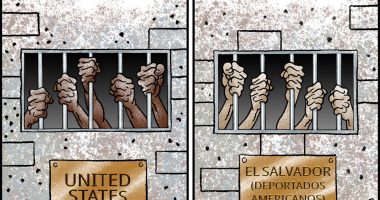
Left: President Donald Trump speaks during a rally protesting the electoral college certification of Joe Biden as President in Washington, Jan. 6, 2021. (AP Photo/Evan Vucci, File)/Center: This photo made available by the U.S. National Archives shows a portion of the first page of the United States Constitution. (National Archives via AP)/The U.S. Supreme Court is seen in Washington, D.C., Feb. 2, 2024. (Francis Chung/POLITICO via AP Images)
It was an unprecedented day as the huge stakes case Trump v. Anderson hit the docket at the U.S. Supreme Court where justices heard arguments for roughly two hours on the question of whether former President Donald Trump is disqualified from Colorado’s presidential primary ballot in 2024 given allegations that he engaged in insurrection on Jan. 6.
The high court has never before weighed Section III of the Fourteenth Amendment, otherwise known as the “insurrection clause” and arguments were densely packed Thursday as justices jockeyed to grill an attorney for Trump, Jonathan Mitchell, as well as an attorney representing voters challenging Trump’s ballot eligibility, Jason Murray.
The court’s questions focused mostly on states’ rights versus the powers of the federal government and vice versa. There was a brief inquiry over what might constitute an insurrection but by and large the justices clung to procedural matters and the language of Section III, avoiding discussion almost entirely on the visceral events of Jan. 6 or Trump’s alleged role in them.
Instead, the court, led by Chief Justice John Roberts, was focused on whether a national election could “come down to just a handful of states.”
“That’s a pretty daunting consequence,” Roberts said.
Justice Samuel Alito seemed inclined to agree with this position, telling the parties that it was a “misnomer” that Section III is considered a “self-executing” statute and that the consequences of one state determining a candidate’s eligibility could be “as some claim,” he said, “quite severe.”
Alito’s position wasn’t surprising given his conservative track record but he wasn’t alone; Justice Elena Kagan, considered a liberal presence on the bench, needled the voters’ attorney on Thursday.
If a single state could decide who gets to be president, she remarked, “it sounds awfully national to me.”
The language of Section III states:
No person shall be a Senator or Representative in Congress, or elector of President and Vice-President, or hold any office, civil or military, under the United States, or under any State, who, having previously taken an oath, as a member of Congress, or as an officer of the United States, or as a member of any State legislature, or as an executive or judicial officer of any State, to support the Constitution of the United States, shall have engaged in insurrection or rebellion against the same, or given aid or comfort to the enemies thereof. But Congress may by a vote of two-thirds of each House, remove such disability.
The six voters in Colorado — a group of Republicans and one independent — represented by Citizens for Responsibility and Ethics in Washington, D.C., or, CREW, launched the bid to remove Trump because they contend he, as an “officer of the United States,” violated Section III when inciting a mob to attack the Capitol in his effort to overturn his defeat to Joe Biden. They also argue he violated his oath by pressuring state legislatures and election officials as well as former Vice President Mike Pence. They accused him of violating his oath again when he engaged in fraudulent schemes to advance fake elector certificates in battleground states and Trump’s outright failure to quickly call down the mob was also cited in the voters’ initial petition to Colorado Secretary of State Jena Griswold for his removal.
But at the Supreme Court on Thursday, the justices seemed less interested in resolving whether Trump “engaged” in insurrection, steering clear of questions that may encroach into territory involving some of his 91 criminal counts in four venues. Many of the charges he faces involve allegations that he attempted to retain power illicitly but the insurrection charge has been omitted in those matters. Trump was impeached a second time by Congress in 2021 for inciting an insurrection, but the Senate acquitted him after deciding not to call any witnesses to testify.
For Trump’s lawyer, impeachment and appointment clauses within the Constitution supported Trump’s claim that only Congress is the final arbiter of whether a person hit with the “disability” of being labeled insurrectionist, can be removed.
“Even if the candidate is an admitted insurrectionist, Section III still allows the candidate to run for office and even win election to office,” Mitchell said. “Then, [we] see whether Congress lifts that disability after an election.”
The point of the Fourteenth Amendment, according to Chief Justice John Roberts, was to limit state power while “augmenting” federal power. But for the petitioners, Murray said that wasn’t quite so with elections because those state powers are preserved elsewhere in the Constitution.
But Justice Kagan pushed back later when fielding argument from Colorado’s Solicitor General, again stating that she believed the Fourteenth Amendment lent itself to restricting state powers.
The justice also emphasized that it was difficult to assess a key element in Section III on its face — whether someone “engaged” in insurrection — because it seemed to her to be an inherently “more political” or “more contested” question.
Justice Kentanji Brown Jackson was arguably the most willing to delve into other details at argument Thursday, including the meaning of the word “insurrection” as well as “officer” as it appears in Section III and whether the presidency was included in its application.
The pressing concerns at the time the Civil War-era provision was drafted, she said, was the “possible infiltration and embedding of insurrectionists into the state government apparatus” as the nation faced the “real risk” that former Confederates may one day return to power in the South.
Why then, she asked, did it seem that Trump’s lawyer had altogether avoided historical context?
Mitchell told the justice that while there was historical proof that drafters of the provision didn’t want someone like Jefferson Davis, leader of the Confederacy, to come to power, for example, for Trump’s purposes, they did not wish to make a “historical argument.”
Jan. 6, Mitchell said, was “not an insurrection.”
“This was a riot,” he bristled. “The events were shameful, criminal, violent. All of those things. But it did not qualify as an insurrection as that term is used in Section III.”
For it to be considered an insurrection, under Mitchell’s definition, there needed to be an “organized, concerted effort to overthrow the government of the United States through violence,” he said.
A “chaotic effort” as Brown Jackson suggested, was not enough.
Justice Sonia Sotomayor appeared frustrated at times on Thursday as Trump’s lawyer reiterated a core plank in his argument that involved term limits: Was a state violating term limits by adding or changing qualifications for the presidency?
“You keep saying term limits,” Sotomayor said to Mitchell. “There are other presidential qualifications in the Constitution. Age. Citizenship.”
The 22nd Amendment already bars anyone from running for an additional term, she reminded him.
“We have a history of states disqualifying not all but some disqualifying candidates who won’t be of age. What if elected? We have a history of at least one state disqualifying someone who was not a U.S. citizen. Are your arguments limited to Section 3?”
When Mitchell said they were not, Sotomayor seemed dubious.
“I’m wondering why the term limits qualification is important to you? Are you setting it up so that if someone runs for president for a third term, that a state can’t disqualify him from the ballot?” she asked.
Age, he argued, was more nebulous to discuss. A person could be 34 during an election but 35 on inauguration day, the required age of a U.S. president. The term limit point he was making before the high court Thursday similarly went to the timing of Trump’s campaign.
“What Colorado has done here, what their Supreme Court has done… President Trump needs to qualify during the time that he would hold office. And the Colorado Supreme Court is saying to President Trump, you have to show that you would qualify under Section III now at the time of the election,” he said.
The Colorado Supreme Court ruled that Trump was ineligible to appear on that state’s ballot, finding his efforts to subvert his defeat to now-President Joe Biden led to the attack on the Capitol and the certification’s delay. Trump’s appeal triggered the hearing before the high court which is aware that the Colorado primary is fast approaching on March 5 and is under pressure to respond quickly.
Ahead of arguments, several amicus briefs arguing for and against Trump’s disqualification were filed; one was a sizable brief from dozens of historians, lawyers and other constitutional experts who collectively urged the court to consider the overwhelming historical and legal evidence that would support the finding that Trump was an “officer of the United States” in violation of Section III after Jan. 6.
As Law&Crime has previously reported, Section III has rarely been invoked to disqualify candidates since its inception. But recently, it was applied in New Mexico against county commissioner Cuoy Griffin. Its proponents argue that without enforcing it, it could render the Constitution a “historical ornament.”
Trump responded to proceedings afterward while speaking to the press, CNN reported. Calling oral arguments a “very beautiful process,” he falsely claimed “there were no guns” on Jan. 6 as the mob attacked the Capitol. In fact, there were several guns and there have been a number of convictions of Jan. 6 defendants establishing this already.
Guns were carried into the Capitol by defendants from Maryland, Texas, Indiana, Alabama, and elsewhere. The Oath Keepers, many of whom were convicted of seditious conspiracy, brought a massive cache of guns to the area, but stashed them in a hotel across the Potomac River.
In a statement Thursday after arguments concluded, the president of the progressive group Alliance for Justice, Rakim Brooks, said the arguments on Thursday suggested to him that the U.S. has “failed the test” the framers of the Fourteenth Amendment set out.
“The framers of the Fourteenth Amendment were the greatest generation the nation has known, having led us through a civil war and secured Lincoln’s new birth of freedom in the aftermath of his assassination. Section 3 was one of their gifts to us. They wanted to ensure insurrectionists would never again threaten our constitutional republic, so they barred insurrectionists from all offices under the United States. They said so as plainly as they could, and trusted future generations to do the rest. My how we seemed to have failed the test. Rather than receive their gift graciously, this Court insults our benefactors. Their questions suggest they believe the framers were indecisive, conflicted, and short-sighted, that they left us absolutely nothing of value in our hour of need. The Constitution deserves better; the nation deserves better.”
Have a tip we should know? [email protected]







